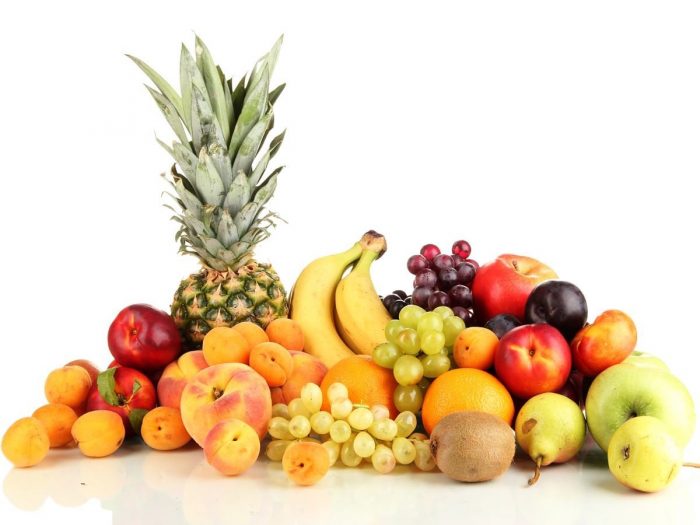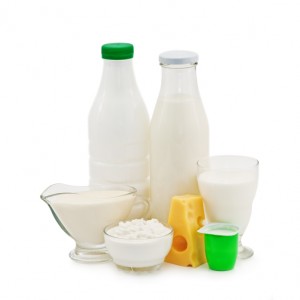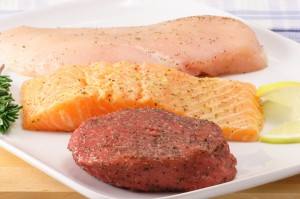Why is fruit important?
Fruit provides vitamins, minerals, dietary fibre and many phytonutrients (nutrients naturally present in plants), which help your body stay healthy. Since fruit is low in kilojoules (energy) relative to many other foods, including it every day can help prevent excessive weight gain. Eating fruit may also help protect against chronic diseases such as heart disease, stroke and some types of cancers (2). Different fruit can help protect the body in different ways, so it’s important to choose a variety of colours everyday such as:
• green (such as apples, grapes, kiwi fruit)
• orange (such as oranges, mango, peaches)
• yellow and red (such as strawberries, banana).
• purple (blueberries, plums, grapes)

Vegetables
Why are vegetables important?
Vegetables provide vitamins, minerals, dietary fibre and many phytonutrients (nutrients naturally present in plants) that help your body stay healthy. Since vegetables are low in kilojoules (energy) relative to many other foods, including them every day can help prevent excessive weight gain. They may also help protect against chronic diseases such as heart disease, stroke and some types of cancers (2). Different vegetables and fruit can help protect the body in different ways, so choose a variety of colours everyday, such as:
• green (broccoli, spinach, peas)
• orange (carrots, pumpkin, sweet potatoes)
• yellow and red (capsicum, tomatoes, corn).
• purple (beetroot and purple cabbage

Dairy
The foods in this group are excellent sources of calcium, which is important for strong, healthy bones. Not many other foods in our diet contain as much calcium as dairy foods. They also provide important nutrients such as protein, iodine, riboflavin and Vitamin B12. The best choices for children over two years of age are low or reduced-fat dairy products.
Why do we need calcium?
Think of your bones as a bank for calcium. If calcium is not deposited into the bank, it will be taken out and used in other areas of the body when needed, which can result in weak, brittle bones. Bones reach their peak density somewhere around age 20-25, so it’s important that calcium is consumed regularly throughout childhood, the teen years and even into the twenties and beyond to ensure bones are at their strongest.
Examples of dairy:
• Milk
• Yoghurt
• Cheese
• Other milk-based products such as ice cream, fromage frais and dessert style custards or mousse do provide some calcium from milk, however they are likely to be high in saturated fat and sugar so they should not be eaten regularly.
• Alternatives such as soy, rice or almond milk. If you purchase alternatives to cow’s milk, always choose products that are fortified with calcium. Check the ingredients list to be sure.

Grains, breads & cereals
Why is it important for children to eat breads and cereals?
Breads and cereals are good sources of fibre, carbohydrates, protein and a wide range of vitamins and minerals. This food group should form the main source of kilojoules (energy) in the diet. Grains are an essential part of a healthy diet, providing nutrients and energy for a child’s normal growth and development.
Whole grains vs processed (white) grains
Whole grain foods are any foods that contain every part of the grain, including the outer layers, bran and germ. Processed, white grains have the bran removed which is where many of the nutrients are stored; they therefore end up having less nutritional value than whole grains. It is possible to purchase fortified grains and cereals in which the lost nutrients have been replaced by the manufacturer, however, wholegrain foods are still the best option.(whole grain and/or high fibre varieties of breads, cereals, rice, pasta, noodles, polenta, couscous, oats, quinoa and barley).

Meat, poultry, fish, eggs and more
Lean meats and poultry, along with fish, eggs, tofu, nuts and seeds, and legumes and beans, make up this very important part of our daily diet. A person needs to eat these protein foods everyday, but why? Your body uses the protein you eat to make lots of specialised chemicals such as haemoglobin and adrenalin that have important jobs in the body. Protein also builds, maintains, and repairs the tissues in your body. Muscles and organs (such as your heart) are made of protein
Tips on eating protein:
- Vary the types of protein foods you eat each day as they each contain important but different nutrients.
- Choose lean meat and poultry to cut down on saturated fat, which is not good for your heart.
- Food such as sausages, ham, salami and devon do contain protein however they are high in saturated fat and salt so should only be eaten occasionally.
- Go meat free once or twice a week and base meals on legumes, eggs, nuts or tofu.
- Eat fish twice per week to get essential omega 3 fatty acids.
https://healthy-kids.com.au/food-nutrition/5-food-groups/
